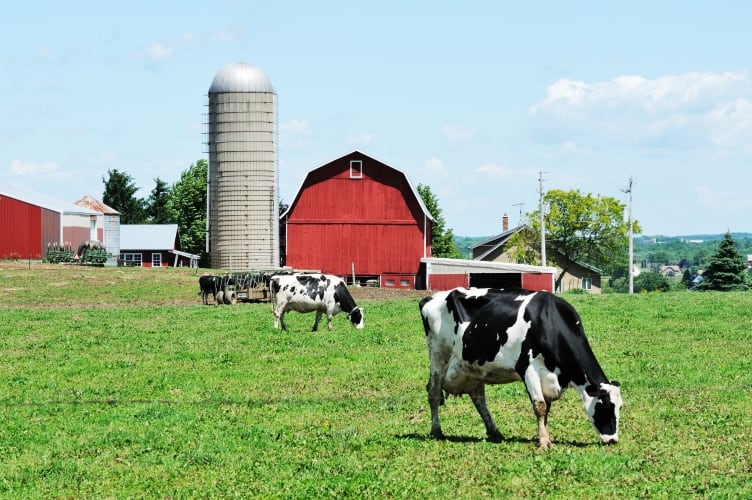Dairy groups urge USMCA ratification
House leaders announced this week that the two sides have agreed on final details of the USMCA, clearing the way for the full House to consider the deal.
The move has been welcomed by dairy groups across the country. According to Purdue University research economist, Maksy Chepeliev, U.S. dairy exports could increase by more than $280m or approximately 5% of total U.S. exports under the USMCA.
President and CEO of the National Milk Producers Federation (NMPF), Jim Mulhern, said passing the USMCA would be a boon to America’s dairy farmers.
“USMCA will expand trade opportunities with our most valuable partners and secure immediate benefits for our rural communities, adding an estimated $548m to dairy-farm revenues in its first six years after implementation,” Mulhern said.
“Newly announced improvements to USMCA will also ensure that if our trading partners flout their dairy obligations under the trade deal, the U.S. has the tools it needs to vigorously enforce our rights. An already good deal for U.S. dairy farmers is even better now, thanks to these changes.”
Tom Vilsack, president and CEO of the U.S. Dairy Export Council, added, "Washington has worked hard to make USMCA an even better deal for America's dairy farmers and exporters; now we are counting on Congress to move expeditiously to pass USMCA and usher in its significant improvements to trade rules.
"Finalizing USMCA will bolster international confidence in the U.S. as a serious negotiating partner and build momentum for other trade agreements in key markets abroad. Without this crucial trade agreement, Made-in-America dairy and agriculture products could be left behind in the new year."
FarmFirst Dairy Cooperative president John Rettler said, “The agriculture industry has been eagerly awaiting the passage of the USMCA, especially dairy. This new trade agreement addresses Canada’s Class 7 pricing issue as well as expanding market access for U.S. dairy.”
Jeff Lyon, FarmFirst general manager, said while there are benefits between the U.S. and Canada in this agreement, its passage will provide security with long-time trading partner Mexico.
“This agreement supports common cheese names, maintaining the use of generic terms such as parmesan and feta. Hopefully, the House and the Senate will pass the USMCA before Christmas. For dairy farmers, that would be the best gift going into 2020,” Lyon said.
Brody Stapel, president of Edge Dairy Farmer Cooperative in Wisconsin, said, “Our farmers have been waiting in uncertainty for more than a year for USMCA to get done. So, it’s certainly good news to see the deal take this significant step forward. There are more steps to be taken, however, so we are not breathing a full sigh of relief.
“USMCA is critical to the long-term success of the U.S. dairy community. Mexico is our number one dairy foods export market and Canada is third. Combined, they account for more than $2bn each year. This agreement would protect those longtime trading relationships and allow for growth in market share. That means economic certainty for businesses, families, employees and rural communities.
“We call upon House leadership to swiftly bring USMCA to the floor and for representatives to pass it. There is too much at stake to wait any longer.”
Agricultural workforce bill moves closer
The House of Representatives also passed the Farm Workforce Modernization Act (H.R. 5038). The bipartisan bill, the first House-passed agricultural labor reform since a comprehensive immigration plan in 1986, includes provisions to address dairy’s workforce needs.
Mulhern said, “The passage of legislation that helps address dairy’s unique workforce challenges is certainly a milestone and an opportunity we must pursue to the fullest.
“Agricultural labor reform is long overdue. With today’s action, it is now imperative that the Senate act to fully address the needs of dairy farmers and all of agriculture, helping farmers do what they do best: feed our nation, and the world.”
Mike McCloskey, dairy farmer and chair of NMPF’s immigration task force said the urgency to reform the agricultural labor system cannot be overstated for dairy farmers.
“House members on a bipartisan basis showed us that they are taking our labor crisis seriously,” McCloskey said.
“We will use this momentum to work with the Senate to build consensus in drafting an improved bill that further addresses dairy’s workforce needs.”
More than 300 dairy, agriculture, business, and agriculture-allied organizations urged House leaders in mid-November to bring the bill to the floor for a full House vote, while more than 80 immigration and labor advocacy organizations called on their representatives to support the measure.
Stapel said the Edge cooperative supported the bill.
“The bill comes at a time of major challenges for our dairy farmers as they struggle to find and keep skilled employees. Changes in demographics, labor patterns and the nature of the jobs have made it impossible for farmers to fill all available positions with American citizens.
“Unfortunately, the existing immigrant ag labor rules, which focus on seasonal work, are unworkable for year-round dairy farming. This bill would provide a way to safeguard our existing workforce and create a process for recruiting new employees.
“While certain items are not ideal, this compromise bill may be the best opportunity in the foreseeable future for a labor solution for our farmers. We urge the Senate to take up the bill, address potential improvements and move legislation forward.”
Dairy Margin Coverage extension
The USDA also moved to help dairy farmers when it said that, due to the prolonged and extensive impacts of weather events this year, it is extending the DMC program deadline by a week to December 20 for producers to enrol for 2020.
USDA announced it is also continuing to accept applications for the Market Facilitation Program (MFP) through December 20.
Bill Northey, USDA Under Secretary for Farm Production and Conservation, said, “2019 has challenged the country’s ag sector – prevented or late planting followed by a delayed harvest has been further complicated by wet and cold weather.
“Because some of our producers are still in the field, time to conduct business at the local USDA office is at a premium. We hope this deadline extension will allow producers the opportunity to participate in these important programs.”
Authorized by the 2018 Farm Bill and available through USDA’s Farm Service Agency (FSA), the program offers protection to dairy producers when the difference between the all-milk price and the average feed cost (the margin) falls below a certain dollar amount selected by the producer.
The MFP is part of a relief strategy to support American agricultural producers. MFP payments are aimed at assisting farmers suffering from damage due to trade retaliation by foreign nations.
For more information, visit the DMC webpage, or the MFP webpage.



